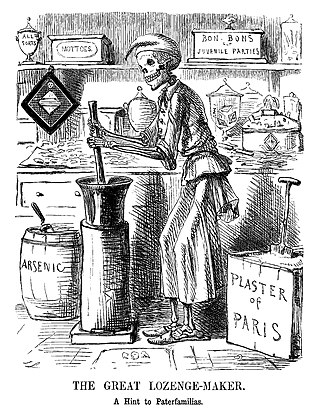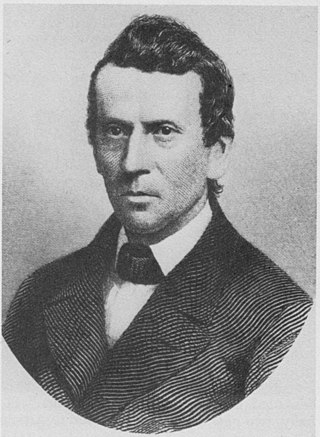
The prohibition of drugs through sumptuary legislation or religious law is a common means of attempting to prevent the recreational use of certain intoxicating substances.

Paregoric, or camphorated tincture of opium, also known as tinctura opii camphorata, is a traditional patent medicine known for its antidiarrheal, antitussive, and analgesic properties.

A pharmacist is a healthcare professional who specializes in the preparation, dispensing, and management of medications and who provides pharmaceutical advice and guidance. Pharmacists often serve as primary care providers in the community, and may offer other services such as health screenings and immunizations.
The Royal Pharmaceutical Society of Great Britain (RPSGB) existed from its founding as the Pharmaceutical Society of Great Britain in 1841 until 2010. The word "Royal" was added to its name in 1988. It was the statutory regulatory and professional body for pharmacists and pharmacy technicians in England, Scotland and Wales. In September 2010, the regulatory powers of the Society were transferred to the newly formed General Pharmaceutical Council (GPhC). The RPSGB became the Royal Pharmaceutical Society (RPS) at that time and retained its professional leadership role; the "Great Britain" part of the name was dropped for day-to-day purposes.

The regulation of therapeutic goods, defined as drugs and therapeutic devices, varies by jurisdiction. In some countries, such as the United States, they are regulated at the national level by a single agency. In other jurisdictions they are regulated at the state level, or at both state and national levels by various bodies, as in Australia.
The Royal Pharmaceutical Society is the body responsible for the leadership and support of the pharmacy profession (pharmacists) within England, Scotland, and Wales. It was created along with the General Pharmaceutical Council (GPhC) in September 2010 when the previous Royal Pharmaceutical Society of Great Britain was split so that representative and regulatory functions of the pharmacy profession could be separated. Membership in the society is not a prerequisite for engaging in practice as a pharmacist within the United Kingdom. Its predecessor the Pharmaceutical Society of Great Britain was founded on 15 April 1841.

The 1858 Bradford sweets poisoning was the arsenic poisoning of more than 200 people in Bradford, England, when sweets accidentally made with arsenic were sold from a market stall. Twenty-one victims died as a result. The event contributed to the passage of the Pharmacy Act 1868 in the United Kingdom and legislation regulating the adulteration of foodstuffs.
This is a history of drug prohibition in the United States.
Victorian Pharmacy is a historical documentary TV series in four parts, first shown on BBC Two in July 2010. It was made for the BBC by independent production company Lion Television. The series producer was Cassie Braben and the Executive Producer was David Upshal. It was filmed at Blists Hill Victorian Town in Shropshire. It is a historical documentary that looks at life in the 19th Century and how people attempted to cure common ailments. Since some of the ingredients of Victorian remedies are now either illegal or known to be dangerous, Professor Nick Barber often used his modern pharmaceutical knowledge to produce similar products without those ingredients. The other main presenters were Tom Quick, a PhD student, and Ruth Goodman, a domestic historian who also appeared in Tales from the Green Valley, Victorian Farm and Edwardian Farm.
The Pharmacy and Poisons Board is the Drug Regulatory Authority established under the Pharmacy and Poisons Act, Chapter 244 of the Laws of Kenya.

The history of pharmacy in the United States is the story of a melting pot of new pharmaceutical ideas and innovations drawn from advancements that Europeans shared, Native American medicine and newly discovered medicinal plants in the New World. American pharmacy grew from this fertile mixture, and has impacted U.S. history, and the global course of pharmacy.
Pharmacy in the United Kingdom has been an integral part of the National Health Service since it was established in 1948. Unlike the rest of the NHS, pharmacies are largely privately provided apart from those in hospitals, and even these are now often privately run.

William Procter Jr. was an American pharmacist. He graduated from the Philadelphia College of Pharmacy in 1837. He is known for his role in establishing the American Pharmacists Association and his work on the United States Pharmacopeia. He was the author/editor of the first pharmacy textbook published in America. He is generally regarded as the Father of American Pharmacy.

R v Lee is the leading case in England and Wales concerning erroneous professional dispensing of a controlled medicine. The case was considered by foremost judges with a conviction in the Central Criminal Court of England and Wales in front of its President, the Recorder of London, and its partly successful appeal in the binding precedent-level Court of Appeal. The case confirmed that a serious error in giving a vulnerable customer a potent drug that does not match in any way the prescription, where such action is not the primary causation of any death or suffering, can result in a prosecution of the responsible pharmacist, with up to 2 years imprisonment, depending on the circumstances.

The Pharmaceutical Society of Ghana was founded on December 19, 1935, out of the former Gold Coast Pharmacists and Druggists Union and the Chemists Defense Association which had existed before 1929. The Society was founded by a group of pharmacists led by William Ayiah Hansen, Hansdrug College of Pharmacy, Hansdrug Hall, Accra. He did so with the support of Dr. D. Duff, then the Director of Medical Services. William Ayiah Hansen was then the Organizing Secretary and Registrar of the Society. Before 1935, the predominant pharmacist groups in Ghana were two associations. Pharmacists affiliated themselves to these groups according to their bonding or non-bonding to government service. The private pharmacists groups were led by William Ayiah Hansen.
Margaret Elizabeth Buchanan was a British pharmacist and pioneer of women in pharmacy.

The Pharmacy Act 1852 was the first legislation in the United Kingdom to regulate pharmacists and druggists.
Frances Elizabeth Deacon (1837–1930) was an English chemist and druggist who was the first woman to qualify after the 1868 Pharmacy Act, which made registration with the Pharmaceutical Society of Great Britain (PSGB) compulsory in order to work as a pharmacist.
Isabella Skinner Clarke–Keer was a British pharmacist and pioneer of women in pharmacy. In 1875, she became the first woman to qualify as a Pharmaceutical Chemist, and was one of the first two women members of the Pharmaceutical Society of Great Britain, admitted in 1879. In 1905, she became the first President of the National Association of Women Pharmacists.

Elsie Higgon was the first Joint Secretary of the (National) Association of Women Pharmacists; researcher for King's College, the British Medical Journal and the British Pharmaceutical Codex; Lecturer in Chemistry at Portsmouth Municipal College; proprietor pharmacist of two businesses in Hampstead, proprietor of the Gordon Hall School of Pharmacy for Women in Gordon Square, and a supporter of the suffrage movement.











